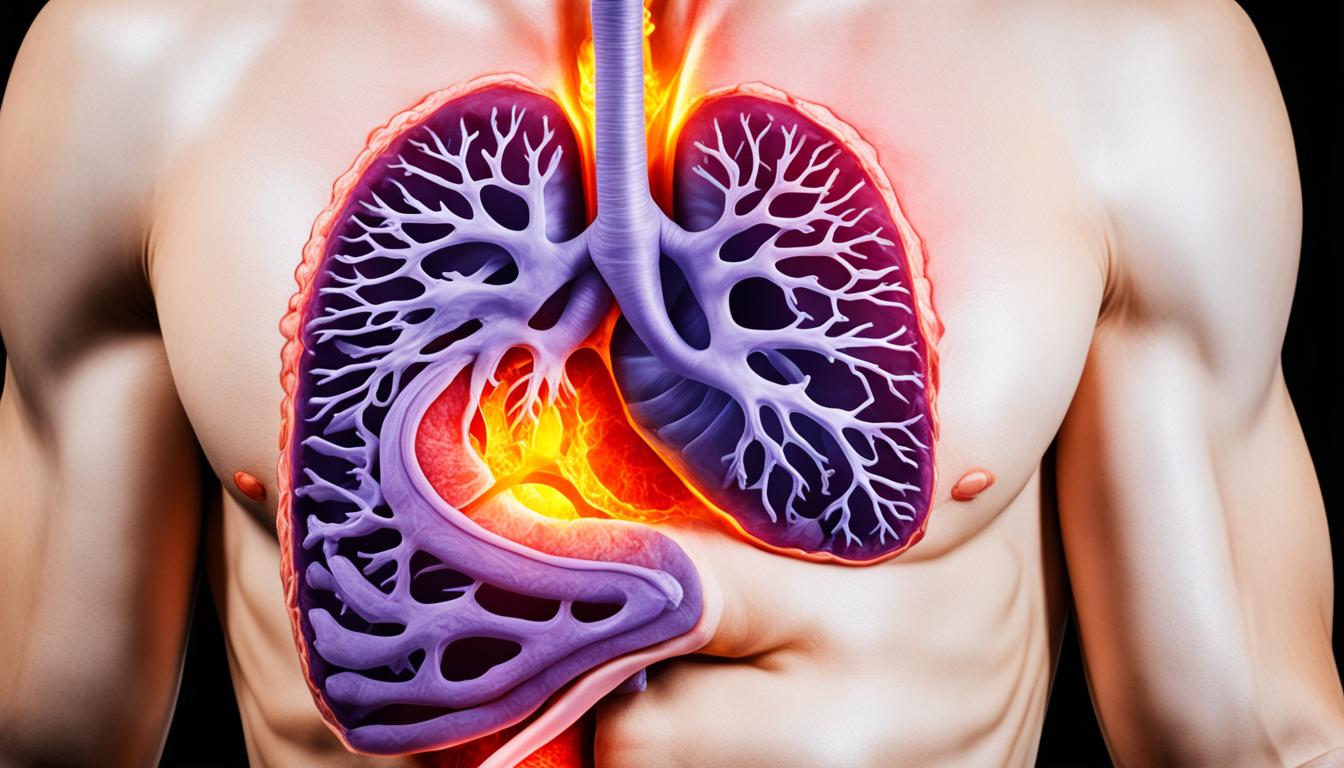Bile reflux is when digestive fluid, or bile, made in your liver, flows back up. It goes into your stomach and up to your throat. It is like acid reflux but requires extra tests to tell them apart. Doctors use medicine, lifestyle changes, and sometimes surgery to treat it.
Key Takeaways
- Bile reflux disease occurs when bile flows back into the stomach, pharynx, and esophagus.
- Symptoms of bile reflux are similar to acid reflux and may include upper abdominal pain, frequent heartburn, nausea, vomiting, cough, hoarseness, and weight loss.
- Causes of bile reflux can include dysfunction of the pyloric valve and the lower esophageal sphincter, surgical complications, stomach ulcers, and previous gallbladder removal surgery.
- Diagnosing bile reflux requires a thorough assessment of symptoms and medical history, as well as additional tests such as endoscopy and pH monitoring.
- Treatment options for bile reflux include lifestyle modifications, medications, and surgery.
- Advancements in stem cell therapy show promise in the treatment of bile reflux.
Symptoms of Bile Reflux
Bile reflux can lead to symptoms that look a lot like acid reflux. It’s key to know these symptoms to get the right medical help and handle the condition well. The most often seen symptoms of bile reflux include:
1. Upper Abdominal Pain
People with bile reflux might feel ongoing pain in the upper belly. This pain can change in how strong it is. It might get worse after eating fatty or fried things.
2. Frequent Heartburn
Heartburn often happens with both acid and bile reflux. You might feel a burning in your chest. This is often with a sour or bitter taste in your mouth.
3. Nausea and Vomiting
Nausea and throwing up are also common with bile reflux. These can happen after eating or at random times.
4. Cough or Hoarseness
Some might get a constant cough or find their voice gets hoarse. This is because stomach acid bothers the throat and vocal cords.
5. Weight Loss
Bile reflux might make you lose weight without trying. This can happen because of eating less or not keeping food down. It’s vital to talk to a doctor about any weight loss that you can’t explain.
Knowing these symptoms helps tell bile reflux apart from other stomach issues. If you have these symptoms, you should see a stomach doctor. They can check you out and suggest the best way to treat it.
| Symptom | Description |
|---|---|
| Upper Abdominal Pain | Persistent pain in the upper abdomen, particularly after consuming fatty or fried foods. |
| Frequent Heartburn | Burning sensation in the chest, often accompanied by a sour or bitter taste in the mouth. |
| Nausea and Vomiting | Feeling of nausea and episodes of vomiting, which may occur after meals or without specific triggers. |
| Cough or Hoarseness | Chronic cough or hoarseness in the voice caused by stomach acid irritating the throat and vocal cords. |
| Weight Loss | Unintended weight loss due to a decreased appetite or difficulty in keeping food down. |
Causes and Diagnosis of Bile Reflux
Bile reflux happens for many reasons. It causes bile to flow backward into the stomach, pharynx, and esophagus. Problems with the pyloric valve and the lower esophageal sphincter are common causes. Surgeries, stomach ulcers, and gallbladder removal can also trigger bile reflux.
Doctors diagnose bile reflux by looking at symptoms and medical history. They might do an endoscopy. This procedure uses a flexible tube with a camera to see inside the digestive tract. pH monitoring is another test that can help. These tests tell bile reflux apart from acid reflux and check for other issues.
Comparisons of Bile Reflux and Acid Reflux
| Bile Reflux | Acid Reflux |
|---|---|
| Flow of bile backwards into the stomach, pharynx, and esophagus | Flow of stomach acid backwards into the esophagus |
| Common symptoms include upper abdominal pain, frequent heartburn, nausea, vomiting, cough or hoarseness, and weight loss | Common symptoms include heartburn, regurgitation, and an acidic taste in the mouth |
| Can be diagnosed through endoscopy and pH monitoring | Can be diagnosed through endoscopy, pH monitoring, and esophageal manometry |
| Treatment options include medication, lifestyle modifications, and surgery | Treatment options include medication, lifestyle modifications, and surgery |
Understanding bile reflux helps healthcare professionals treat it. They can create good treatment plans. This improves the patient’s life.
Treatment Options for Bile Reflux
Managing bile reflux means changing your lifestyle, taking medicine, and sometimes getting surgery. These steps can lessen symptoms and help your digestion.
Lifestyle Modifications
Changing your daily habits can make a big difference in handling bile reflux. It can also boost your health overall. Here’s what experts suggest:
- Quit smoking: Smoking can make bile reflux worse and slow down recovery. Stopping smoking brings major benefits to those with bile reflux.
- Eat smaller meals: Eating less more often can lower stomach pressure. This prevents bile from flowing the wrong way.
- Avoid high-fat foods: Foods with a lot of fat can set off bile reflux symptoms. Choose a diet with plenty of fruits, veggies, and lean meats instead.
- Maintain a healthy weight: Being overweight raises bile reflux risks. Regular exercise and a balanced diet can help reduce symptoms.
Medications
Some medications aim to control bile reflux symptoms and encourage proper bile flow. Doctors might prescribe:
- Ursodeoxycholic acid pills: These drugs can break down and prevent gallstones, which may cause bile reflux.
- Proton pump inhibitors (PPIs): PPIs can cut down the amount of stomach acid. This helps ease symptoms linked to too much acid and bile reflux.
Surgical Options
When medication and lifestyle changes aren’t enough, surgery might be needed. Here are the surgical treatments:
| Surgical Option | Procedure |
|---|---|
| Diversion Surgery (Roux-en-Y) | This operation changes the path of bile so it skips the stomach. A new pouch is made in the small intestine to divert bile. |
| Anti-reflux Surgery | Known also as fundoplication, this surgery strengthens the barrier against bile and acid flowing back into the esophagus. |
Talking with a healthcare expert is essential to pick the right treatment for you. It depends on your specific condition and how serious it is.
Through changing your habits, taking the right meds, and surgery if needed, bile reflux can be managed. This can make life much better.
Lifestyle and Home Remedies for Bile Reflux
Dealing with bile reflux means changing your daily habits and using home treatments. Even though natural fixes for bile reflux haven’t been proven to cure it, they’re worth trying along with doctor-recommended therapies.
Here are useful ways to manage bile reflux:
- Bile reflux diet: Opt for a diet that has foods low in fat and not too acidic. Choose lean meats, whole grains, and lots of fruits and veggies. Try to stay away from foods that are fatty and spicy to avoid triggering symptoms.
- Managing bile reflux: Stopping smoking can make a big difference, as smoking makes symptoms worse. Eating smaller meals throughout the day is better than having big ones. Standing up straight after meals can also help keep reflux at bay.
- Avoid alcohol: Drinks with alcohol can make your body produce more bile and make symptoms stronger. It’s best to cut down or stop drinking alcohol.
- Weight management: Losing weight if you’re overweight can lessen symptoms of bile reflux. A healthy lifestyle with regular exercise and balanced eating is key to losing weight and feeling better overall.
- Elevate the head of the bed: Lifting the head of your bed 6 to 8 inches can stop bile and acids from coming up while you sleep. You can use bed risers or wooden blocks under the bed legs for this.
- Practicing relaxation techniques: Being stressed or anxious can make digestive problems worse. Doing things like deep breathing, meditating, or yoga every day can lower stress and improve your health.
While changing your lifestyle and trying these home treatments can help, talking to a doctor is vital. They can offer advice that fits your health needs and history.

Conclusion
Bile reflux can greatly affect your life. Just like acid reflux, it needs extra tests to be diagnosed correctly. Knowing the causes, signs, and treatments helps manage it well with a doctor’s help.
Dealing with bile reflux might include medicines, changing some habits, and sometimes surgery. Stop smoking, eat healthily, and avoid greasy food to feel better. Drugs can lessen acid, and surgeries can offer a long-term fix.
Also, there’s exciting news about stem cell therapy for bile reflux. Research in Thailand is looking into how it can help. This could mean better treatment and life quality for people suffering from bile reflux.

